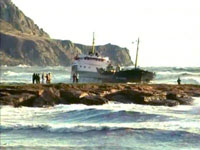Russian oil tanker sinks in fierce storm spilling 560,000 gallons of toxic fuel
A Russian oil tanker split in two during a strong storm, spilling at least 2,000 metric tons (560,000 gallons) of toxic fuel into a strait leading to the Black Sea. It became the worst environmental disaster in the region in years. Experts say that it may take years to clean the waters.

The 8-meter-high (18-foot) waves also sank two Russian freighters nearby, in the Strait of Kerch, a narrow strait linking the Black Sea and the smaller Sea of Azov to the northeast. Eight sailors from one freighter were missing, but rescuers saved all the crew members the other vessel.
The two ships together were carrying about 6,500 metric tons (7,150 tons) of sulfur, said Sergei Petrov, a spokesman for the regional branch of Russia's Emergency Situations Ministry.
In total, as many as ten ships sank or ran aground in the Strait of Kerch and in the nearby area of the Black Sea, and reports said three other sailors were dead or missing.
The Russian tanker's 13 crew members were rescued, emergency authorities said.
The tanker, the Volganeft-139 - loaded with nearly 4,800 metric tons (1.3 million gallons) of fuel oil - was stranded several kilometers (miles) from shore. Stormy weather was preventing emergency workers from collecting the spilled oil which was sinking to the sea bed, authorities said.
"There is serious concern that the spill will continue," Oleg Mitvol, the head of the state environmental safety watchdog Rosprirodnadzor, said on Vesti 24 television. He said it would take "several years" to clean the spill.
Two barges loaded with fuel oil also ran aground in the area but did not leak, Petrov told the AP. A Turkish freighter, Ziya Kos, also ran aground, he said.
Vesti 24 also reported the sinking of a Russian freighter carrying metal near the port of Sevastopol on Ukraine's Crimean Peninsula. Two members of its 16-man crew drowned and one was missing, it said.
Maxim Stepanenko, a regional prosecutor, told Vesti 24 that captains had been warned Saturday about the stormy conditions. He said the oil tanker - designed during Soviet times to transport oil on rivers - was not built to withstand a fierce storm.
Mitvol said that, while the sulfur did not present an environmental danger, the two freighters might also leak fuel oil from their tanks, adding to the pollution.
Jim Farr, a chemist with the U.S. National Oceanic and Atmospheric Administration's Ocean Service office of response and restoration, said the sulfur wouldn't create a "hazardous situation."
Farr said that while on land, sulfur can be used as a fungicide, it would not act as one in a marine setting. He compared the spill to dumping a load of sand in the water and smothering a reef, or covering a patch of grass with a blanket.
He added, however, that it was difficult to speculate on the long-term effects without better knowledge of the area, including its depth and currents.
Alexei Zhukovin, an expert with the Emergency Situations Ministry's branch in southern Russia, also said sulfur was not dangerous to the region's habitat. But Sergei Baranovsky, president of the Green Cross environmental group, contended that sulfur could be potentially even more hazardous to nature than the fuel oil, RIA Novosti news agency reported.
The Black Sea is bordered by Russia, Turkey, Romania, Bulgaria, Ukraine and Georgia.
Subscribe to Pravda.Ru Telegram channel, Facebook, RSS!


